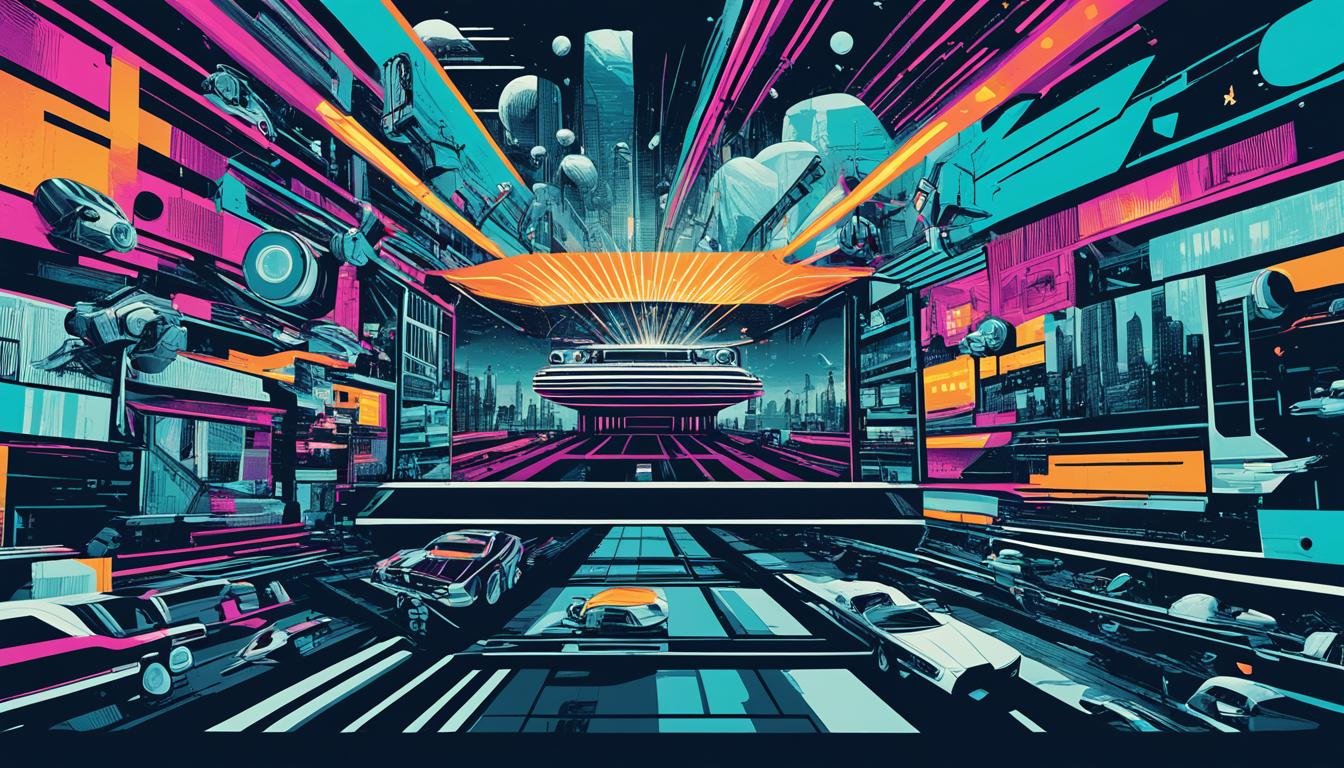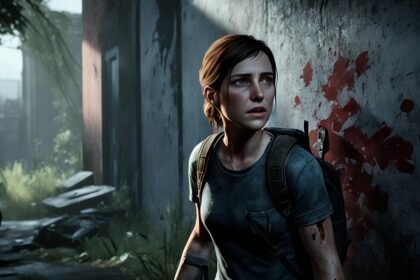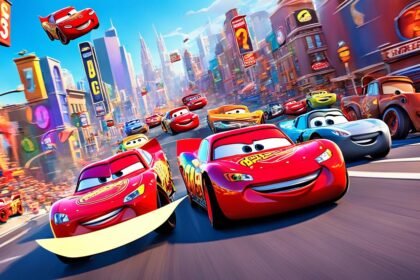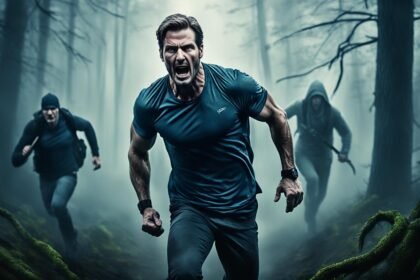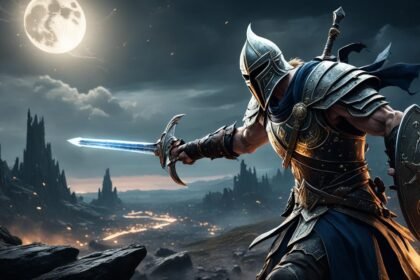We’re here to dive into the iconic film, Modern Times. It was released in 1936 and is a silent, black and white movie. This film is a milestone in cinema, thanks to Charlie Chaplin. He directed, wrote, produced, composed music, and starred in it, showing his amazing skills.
In the movie, Chaplin plays a character named Charlot. He’s in a world taken over by machines during the industrial revolution. It mixes funny and serious parts to talk about society’s push to be the same. Charlot stands against this, causing trouble where everyone’s supposed to act alike.
Paulette Goddard also stars in Modern Times. She shows her acting range, making the story richer. Goddard is a key player in making the film feel real and deep.
One memorable scene in the movie is when Chaplin sings a funny, nonsense song. It was a dig at the new talking movies. This moment shows Chaplin’s wit and insight into his changing industry.
What makes Modern Times so loved is how it mixes laughs with deep messages. It’s all about never giving up, shown in moving scenes. The end scene, with Charlot running through a factory, is well-remembered for its power.
Over the years, the movie has won a lot of praise. Its high rating on IMDb and glowing reviews from both viewers and experts prove its value. The film is even tagged as a masterpiece by Metascore.
Modern Times is a must-see, running for just 1 hour and 27 minutes. This makes it easy to watch and full of impact. The starring cast, including Chaplin, Goddard, and Henry Bergman, truly breathes life into the story.
Throughout this article, we’ll explore why Modern Times is such an important film. We look at Chaplin’s vision, the time it was made in, its social points, and why it’s still relevant today. We’re here to honor a true classic, celebrating its huge impact on cinema.
Key Takeaways:
- Modern Times, released in 1936, is a black and white silent film directed by Charlie Chaplin.
- Chaplin’s versatile talent shines through as he takes on multiple roles in the creation of the movie.
- The film combines comedic elements and dramatic moments, striking a balance between entertainment and social commentary.
- Modern Times showcases the struggles of the working class during the industrial revolution and the Great Depression era.
- Charlie Chaplin’s performance as Charlot and Paulette Goddard’s versatility add depth to the film.
The Brilliance of Charlie Chaplin’s Modern Times.
Charlie Chaplin’s Modern Times is a silent film that shows off his amazing comedic and acting skills. He plays the Tramp, a lovable but clumsy character. This film makes us laugh and think about life at the same time.
Ranked #48 on the TSPDT list in 2020, Modern Times is known as a top film worldwide. It’s a key work in Chaplin’s career, blending his silent movie roots with new talking film features. This mix shows Chaplin’s growth as a movie maker.
Chaplin’s talent goes beyond just making us laugh. He uses his films to speak out against bad things in society. In Modern Times, he tackles issues like unfair work conditions and the negative sides of making things fast in factories.
Modern Times is still loved today, more than 80 years after it first came out. Why? Because its messages about finding joy and fighting for fairness are still true today. This makes it stand out as a classic worth seeing.
And let’s not forget its amazing ending. It focuses on the value of friendship in a world that can be pretty tough. This powerful message is one reason why the film is kept safe for the future by the Library of Congress since 1989.
Chaplin was a total artist. He didn’t only act and direct; he also scored his movies. This made the films even more touching and memorable. Modern Times is a great example of how his music and movies work together perfectly.
In the end, Modern Times shows Chaplin at his best. It’s a mix of comedy and heart, with lessons we can still learn from today. This is why it’s a must-see for everyone.
The Impact of Modern Times on Film History.
Released in 1936, “Modern Times” is a hit made by Charlie Chaplin. It blends old silent film ways with modern social commentary. This mix made the film a favorite for many, influencing future filmmakers and scholars. Let’s dig into how this movie changed cinema history.
One standout is Chaplin’s role as The Tramp. This well-known character shows Chaplin’s amazing talent as an actor and director. The Tramp is still loved today, proving its timelessness.
The film was bold for highlighting social and worker causes. It shows the struggle of workers in a system that takes their identity away. Through Chaplin’s lens, we see a strong message about the working class.
“Modern Times” also talks about money and jobs in America. It shows the big gap between the rich and the poor. Even though it’s from the early 1900s, these issues are still talked about today.
“Modern Times” speaks volumes on surviving in tough social and economic times. Its impact for over 85 years makes us think about our society’s progress and staying positive.
The film uses lots of funny actions and comedy. Chaplin’s perfect timing and funny faces make the story even better. So, “Modern Times” isn’t just deep, it’s also fun to watch.
Even at 90 minutes long, the film keeps you hooked. It follows The Tramp’s journey, showing the good and bad. It’s about hope in difficult times, making it a movie that sticks with you.
Besides its cultural value, “Modern Times” pushed movie-making forward. It helped movies transition from silent to sound. Even though it’s silent, Chaplin’s use of sound adds a special touch to the film.
The movie marked the end of The Little Tramp’s era. Chaplin ended this chapter in a heartfelt way. The film debuted in New York on February 5, 1936, and later in London and Hollywood. The Hollywood show was special as it focused only on the movie, showing its unique impact.
Impact of “Modern Times” on Film History
| Release Year | Rating | Portrayal of The Tramp | Leftist and Pro-Worker Themes | Emphasis on Economic Inequality |
|---|---|---|---|---|
| 1936 | ★★★★ | ✓ | ✓ | ✓ |
“Modern Times” is much more than a film. Its message about social issues and its impact on movies can still be felt. This outstanding piece by Charlie Chaplin shows what cinema is capable of. It proves how powerful films can be, now and always.
The Historical Context of Modern Times.
In 1936, Charlie Chaplin faced economic hardships when making Modern Times. This iconic film showed Americans’ struggles during the Great Depression. It focused on the effects of the industrial revolution on the working class.
The film showed the harsh truth of the Great Depression. Many people lost their jobs and lived in poverty. Modern Times painted a vivid picture of this, focusing on unemployment and financial struggles.
Chaplin highlighted the bad work environments that harmed workers’ health. The main character, the Little Tramp, even stole to survive. Audiences were moved by the film’s depiction of these tough times.
“Modern Times” masterfully depicted the struggles of the working class during a time of unprecedented economic crisis.
At that time, the fear of communism was strong. This fear shaped society and made Modern Times even more important. It let Chaplin address these fears and issues through his movie.
Though made during the Great Depression, Modern Times is relevant today. The challenges workers face have changed little over time. The film reflects these hardships, such as job losses and business closures we’re seeing during the COVID-19 pandemic.
Another important point Modern Times makes is about how workers are treated. It criticizes systems that can make people feel like they’re not valued. This message is still important today, making us think about the systems we live in.
Chaplin used music to uplift the film, especially the song “Smile.” The song’s message – to stay hopeful in hard times – is universal. It still inspires people today, showing the power of hope.
| Release Date | Locations | Composed by |
|---|---|---|
| February 5, 1936 | New York | Charlie Chaplin |
| February 11, 1936 | London | Charlie Chaplin |
| February 12, 1936 | Hollywood | Charlie Chaplin |
Social Commentary in Modern Times.
The movie “Modern Times,” directed by Charlie Chaplin, came out in 1936. It’s way more than just a funny silent film. It talks about challenges the working class faced and how factories made people feel like they weren’t human. The story happens during a really tough time in America called the Great Depression.
Charlie Chaplin was famous for his timing and funny movements. He used these skills in “Modern Times” to show how hard life was for the Tramp, his working-class character. The Tramp gets caught in the tough world of a factory job. This shows the brutal side of assembly lines and how workers had little say in their own lives.
The movie talks about how we should treat each other well as the world changes fast. It questions the race for money in business and shows how it can make people feel less important. We see the tough life of the working class in “Modern Times.” This makes us think about why there’s such a big gap between the rich and the poor.
The job market and capitalistic way of life can strip people of their uniqueness.
Even though “Modern Times” points out the problems of the time, it still ends with a positive message. Happiness, it says, comes from spending time with the people we care about, not from things we own. This thought is still meaningful today.
There’s a song in the movie called “Smile.” It talks about how even when things are hard, life is still good if you stay positive. This song’s message is powerful and very true.
“Modern Times” makes us think about how we can make society better. It brings up hard questions about issues we’re still dealing with today. This film is a legendary work that keeps talking to us about the troubles brought by big economic gaps, factory jobs, and the lives of the working class.
Key Themes Addressed
- Working-class struggles
- Economic inequality
- Dehumanizing effects of industrialization
Visual Brilliance in Modern Times.
Charlie Chaplin’s film Modern Times shines with its amazing visuals. Released in 1936, this movie proves that silent films are still moving. Chaplin tells a captivating story without using words, highlighting his unique filmmaking style.
The movie is packed with funny scenes, showing Chaplin’s comedic talent. For instance, there’s a scene where his character gets trapped in a machine meant to feed workers. These scenes are not just funny but also deepen the story, making Modern Times a classic.
Chaplin pays great attention to every detail in the film. The way characters move and the look of each set is all carefully done. This makes the movie not just a comedy but a work of art that we still enjoy today.
Besides the funny parts, Modern Times talks about serious topics. Chaplin uses images to show the downsides of capitalism and how it affects workers. He makes us think about big issues, even today.
Modern Times is still seen as a key example of filmmaking. It shows how powerful using images can be. Chaplin’s mix of humor and serious themes makes this not just a movie but a lesson in film history.
Timeless Themes in Modern Times.
Modern Times may be from a while back, during the Great Depression, but its themes feel current. Charlie Chaplin crafted a classic that highlights issues like labor misuse and how capitalism can strip us of our humanity. It’s all wrapped up in a comedy package.
The 1930s in the U.S. were tough, thanks to the Great Depression. Chaplin’s film showcases the industrial world’s struggles, spotlighting the massive poverty and joblessness hitting America.
Fast forward to today, the COVID-19 pandemic’s punch has hurt the U.S. economy bad. With businesses shutting and job losses soaring, we see Modern Times’ themes playing out again. There’s even a worker shortage, underlining the film’s key point about how labor can be exploited.
Modern Times isn’t just a fun watch; it points a critical finger at how we work and do business. It argues that efficiency shouldn’t trample over workers’ dignity and humanity. A key message we should always remember.
The Importance of Human Connections
Modern Times’ true heart lies in its lesson on joy. It shows that true happiness isn’t found in stuff but in the connections we make with others. These pure relationships light the darkest moments.
Charlie Chaplin eloquently captures the essence of human resilience and our capacity to find value in life despite adversities through the poignant song “Smile,” featured in the film. This uplifting message serves as a reminder to persevere and maintain a positive outlook, no matter the challenges we face.
Entertainment, through films like Modern Times, mirrors our world’s biggest worries. It urges us to closely look at the social and systemic gaps still around today. Chaplin’s work not only tickles our funny bone but also makes us think deeply about what it means to be human.
Debuting in 1936, Modern Times is still celebrated. It proves cinema’s ability to immortalize important issues and stories. Chaplin tapped into his era’s struggles, creating a masterpiece that’s a must-watch till today.
The Performance of Charlie Chaplin in Modern Times.
Charlie Chaplin shines in Modern Times as the lovable Little Tramp. His performance wows people with incredible physical comedy. He truly masters his role, charming everyone who watches.
Chaplin turns his body into a comedy machine in Modern Times. He’s known for his perfectly timed moves and funny yet graceful actions. This brings a unique level of fun to his work.
Chaplin’s physical acting adds more than just jokes. It tells deep stories and touches the heart. His face and body express so much, making us feel all kinds of emotions.
“Chaplin’s physicality in Modern Times is a work of art. His comedic timing and physical dexterity are a joy to watch.” – Film Critic
In every moment, Chaplin’s commitment to his role is clear. He mixes jokes with touching moments, making his character feel real. This approach makes his work timeless, connecting with people of all ages.
Chaplin didn’t stop at acting. He also crafted the movie’s music, showing his massive talent and creative mind. By controlling what we see and hear, he made a film that’s truly his own. It’s a full experience he designed for us all.
Charlie Chaplin truly shines in Modern Times. His amazing physical comedy and deep acting make the movie a classic. Even now, his work entertains and moves people, showing its lasting power.
Modern Times as a Timeless Classic.
Released in 1936, Modern Times still captivates audiences today, 85 years later. Charlie Chaplin’s genius made this film a timeless classic that everyone, from any era, can enjoy.
This film mixes comedy with strong messages about society. Chaplin’s work shows his deep understanding of storytelling and the impact of cinema.
“Modern Times doesn’t just make us laugh, it makes us think. It shows us the struggles of common people and criticizes big industry and capitalism.”
Chaplin tackles big issues of the 1930s like poverty and unemployment in Modern Times. He also highlights economic inequality and the rise of machines that took over peoples’ jobs.
The movie is also a snapshot of the Great Depression’s effects in the U.S. after 1929. It shows how hard life was during that time, which Franklin D. Roosevelt also had to deal with.
Today, Modern Times is more than a history lesson. With the recent pandemic’s impact on jobs, its message feels very current. The film reminds us of the challenges we face, then and now.
Chaplin’s skills as an actor and filmmaker shine in Modern Times, thanks to his unique silent acting and his music. These elements let us connect deeply with the characters’ stories and feelings.
Scenes like the Tramp in the machinery are unforgettable, showing how humor can also be thought-provoking. Chaplin’s mix of laughs and deep messages is what made, and still makes, Modern Times so special.
Reviewers and critics have praised Modern Times for its enduring brilliance:
| Platform | Score |
|---|---|
| Rotten Tomatoes | 98% |
| Metacritic | 96/100 |
The movie was highly praised then, and it still is today. The favorable reviews and scores it gets show how impactful and loved Modern Times is.
Modern Times is more than a movie; it’s art. It balances humor with deep looks at society and the human experience. Chaplin’s masterpiece is timeless and continues to touch hearts, making it a must-see for all.
Modern Times and Its Relevance Today.
Modern Times, a film from 1936, shows the struggles of the Great Depression well. It’s still very relevant today, tackling topics like working conditions and the negative effects of a capitalistic society. Charlie Chaplin’s work is a timeless masterpiece.
The Great Depression was tough, causing a big economic downturn. Businesses closed, and people lost their jobs, much like today with the COVID-19 pandemic. Many were left without work.
Though different from the past, we face a similar issue of not having enough workers now. This makes it hard for businesses to find people, raising concerns over how employees are treated. The film highlights these labor issues.
Chaplin’s view of the work line in Modern Times shows the less humane side of work and capitalism. He points out how working repetitive tasks takes away workers’ personal freedom. Today, many workers also feel their rights and voices are being ignored.
Throughout the story, Chaplin shows how capitalism can be bad for people and very dehumanizing. He tells these serious messages in a clever and funny way. It makes us think about systems that value money over the well-being of workers.
“Modern Times” remains powerful, even today, showing how its thoughts on work and capitalism still matter.
Chaplin’s choice of music, especially “Smile,” talks about hope and being strong when times are hard. It reminds us that being happy and keeping our humanity is very important.
For more than 85 years, Modern Times has continued to hold its meaning. It discusses work and capitalism in a way that’s always relevant. This film is a steady reminder that the challenges workers face and the issues with capitalism are not new.
To sum up, Modern Times is a crucial film that brings up important social issues. It invites us to think about the effects of capitalism and the unfair treatment of workers. By learning from this film, we can aim for a future that’s fair and kind to all.
Conclusion
“Modern Times” is a timeless masterpiece by Charlie Chaplin. It was released in 1936. The movie captured the struggles of the Great Depression era through social commentary.
The film explores the exploitation of labor and criticizes capitalism. It also highlights the challenges the working class faced. Chaplin used visual storytelling and slapstick comedy effectively. This helped viewers connect with the movie’s message about remaining human in a mechanical world.
“Modern Times” carries a powerful message that still impacts viewers today. It remains a key piece of cinema. Chaplin’s focus on social issues and timeless themes has made it an enduring classic. The film will keep inspiring audiences and sparking new thoughts for years to come.
FAQ
What is Modern Times?
Charlie Chaplin made Modern Times, a silent movie, in 1936. This film mixes silent acts, funny scenes, and social jokes. It is a famous movie that talks about being kind to others and the hard times faced by people working in industry.
When was Modern Times released?
It was released in 1936. This was when many people were without jobs and life was very tough for many.
What does Modern Times satirize?
A: Modern Times makes fun of the big change brought by machines and money in the world. It shows a funny but meaningful story about how workers are treated and why it’s important to care for each other.
What is the significance of Modern Times in film history?
Many believe Modern Times is one of Chaplin’s best works. It’s special because he mixed his funny acting with thoughts on big social issues. This way of making movies is still remembered and respected today.
How does Modern Times address timeless themes?
A: Modern Times talks about old problems that still happen now, like workers being used too much and losing their human act. So, it’s a film that we can still learn from and think about today.
How does Charlie Chaplin’s performance in Modern Times standout?
Chaplin really shines in this movie. He makes everyone laugh and feel things without saying a word. His movement and face tell a story by themselves.
Is Modern Times still regarded as a classic?
Yes, Modern Times is still seen as an amazing film. It mixes being funny with saying things that make us think. This way, it keeps touching the hearts of new viewers.
Does Modern Times remain relevant today?
Yes, the film still makes sense today. It talks about issues like too much work and not being treated like a whole person in a job. It reminds us that caring for others is very important.
What is the impact of Modern Times on cinema?
A: Modern Times changed how movies were made. Chaplin used his skills to tell important stories in a way that made people laugh and understand. Many filmmakers have been inspired by this movie since then.
What is the overall message of Modern Times?
The movie’s main idea is about being kind and helping the workers who have a hard time. It tells this serious message using funny scenes and actions.
What is the enduring legacy of Modern Times?
A: Modern Times is still loved because it shows how smart Chaplin was as a filmmaker and an actor. Its jokes and messages about society make people keep watching it even today.


